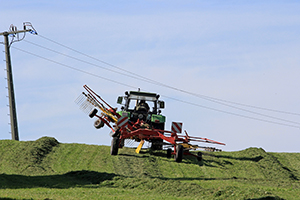 Oversized farm equipment, like combines, cotton pickers, irrigation pipes and portable grain augers, can easily make contact with overhead electrical lines. Looking for and reporting low hanging electrical lines, and taking other safety precautions, will help prevent costly claims, repairs, and downtime. Most importantly, taking extra care when working around electrical lines could help save your life or the life of your workers.
Oversized farm equipment, like combines, cotton pickers, irrigation pipes and portable grain augers, can easily make contact with overhead electrical lines. Looking for and reporting low hanging electrical lines, and taking other safety precautions, will help prevent costly claims, repairs, and downtime. Most importantly, taking extra care when working around electrical lines could help save your life or the life of your workers.
Before working in a field, take these necessary precautions to reduce the risk of operating farm equipment near electrical lines:
- Check Clearances. Make note of overhead electrical lines where you are working and around roadways used to get from one field to another. This is especially important when making turns at the end of a field that adjoins a roadway lined with electrical lines.
- Plan a route for your equipment to maintain a safe distance from all electrical lines. Look for any abnormalities including leaning poles, broken poles, broken or loose guy wires (caused by weather, animals, age), and any recent or man-made events that may have altered the ground elevation. Check for the pole’s “birthmark,” information branded onto the electric pole. The birthmark should be chest high at around four or five feet. If it appears too low or high, the ground elevation has likely changed.
- If possible, maintain a minimum of 10 feet of clearance between your equipment and electrical lines. If you are unable to safely pass under electrical lines, contact your power company for help.
- Check your equipment. Know the height of your farm equipment in both harvest mode and transport mode, especially if you are using new or unfamiliar equipment. When moving between fields or traveling on roads, place farm equipment into transport mode to reduce its height. Failing to do so could make you responsible for any damage if your equipment takes down power lines.
- Make sure grain bins are a safe distance from electrical lines to allow your equipment the room needed to fill the bins easily and safely.
- Remember even small objects like tree limbs, ropes or straw that make contact with an electrical line can conduct electricity.
- Always take time to review safety measures when working around electrical lines with all of your farm workers (full-time, part-time, family or volunteers, etc.).
- Accidents can happen any time of the day, but they are more likely to occur in low light when it is harder to see electrical lines.
Report Low Hanging Electrical Lines
Never assume it is safe to pass under an electrical line. If you see low hanging electrical lines or need help to ensure the lines meet farm equipment clearance requirements, contact your utility company for assistance so that the line can be raised to the required height, if needed.
What to Do If Equipment Makes Contact with an Electrical Line
If your farm equipment makes contact with an electrical line:
- Stay in the piece of equipment unless it is on fire. The equipment itself will be grounded and protect the worker from electrocution.
- Immediately call the power company to disconnect the power line.
- Never allow any part of your body to touch the ground and piece of equipment at the same time that it is touching an electrical line.
- If the equipment is on fire and you have to leave it, jump as far away as possible. Keep both feet together and in contact with the ground at all times while shuffling away from where you jumped until you are at least 100 feet away from the equipment.
- Never try to reenter or touch a piece of equipment.
Farm Bureau Insurance is Here to Help
Dedicated to protecting you, your farm, your family and your workers, Farm Bureau Insurance is here to help you assess your insurance coverage needs and assist with loss control and prevention. To learn more, contact your local Farm Bureau Insurance agent. Find an agent near you or reach a customer service representative at 1-800-799-7500.